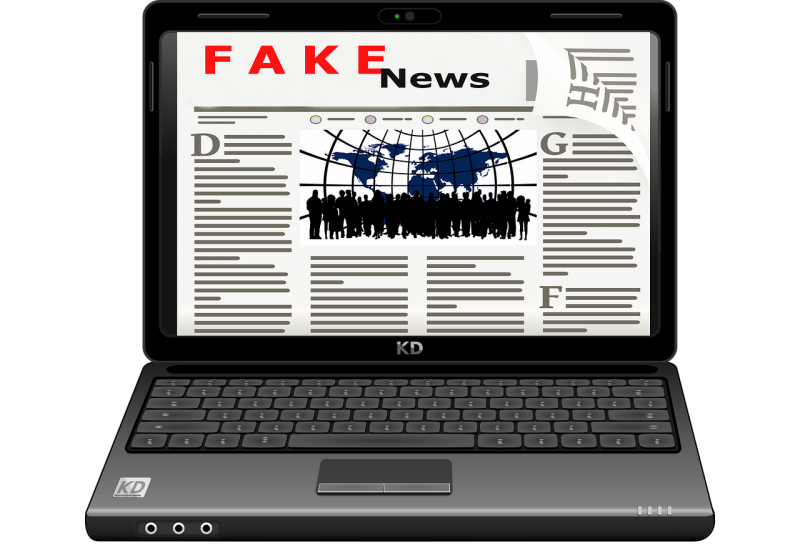Everyone who has read the news or frequents social media has heard the term “fake news.” Surely, almost everyone has seen or read it, most likely unknowingly.
It is sometimes tough to spot, which is why so often sites like Facebook have in recent years placed warnings on top of posts or removed them altogether.
From the half-truths, to misinformation and disinformation, to outright lies, political pundit Andrew Klavan attempted to cut through the haze in this five minute video that discussed media bias, and how to best identify it. It’s a growing phenomenon that has several consequences, including the gnawing of mistrust of the media, and/or the public believing what isn’t true.
Incredibly, fake news received significantly more engagements than real news on social media in 2020, according to British media The Independent.
DW reports some fun fake news in 2022, including: Ukrainian Nazis rioting at the World Cup in Qatar, that there is an epidemic of fleas in Germany, and how eating parsley induces fetal death!
Meanwhile, AP has a running column on fake news checking, including a doozy from December, 2022, that said 118,000 children died suddenly in their sleep correlating to receiving the Covid-19 vaccine.
Still, in other examples, even the mainstream media has been caught peddling a false news item.
The Herald Sun had a list of worst fake news, this time coming from such luminaries as a Washington Post article saying that Russians had hacked a US electrical grid, and an NBC story that said Russians attacked US diplomats with a super sonic microwave weapon.
In his article This is How Fake News Spreads, US syndicated radio host Dennis Prager pointed out that Newsweek – one of the most venerated media in the US – simply didn’t twist the truth when reporting on a talk he did. They made stuff up completely.
The article said he ridiculed Holocaust diarist Anne Frank, which he did not do. He has never compared Democrats or liberals to Nazis, but the article said the opposite. He and the magazine’s global editor in chief reached each other a few days later. The editor agreed that Prager had been mischaracterized, and article’s headline, in addition to some of its content, were revised accordingly.
(Unfortunately, the reporter has yet to be disciplined, and the original lie was repeated in numerous left-wing media.) But fake news isn’t just a fixture in newsmedia and bloggers – it’s being used as political point scoring by state actors.
One of the most absurd recent examples is how Albanian media claimed that Russian oil was illegally transported by a ship owned by Azerbaijan, heading to an Albanian port.
The reports said the ship, called “Grace Felix,” was alleged to be carrying more than 22 tons of oil, and seized in Albanian waters by that country’s police. These reports added that the shipment was illegal because Albania abides by the UN Security Council embargo of Russian oil.
Of many fundamental problems is that no one bothered to do due diligence, and obtain all sides of the story. It’s a key requirement in any news story, for any journalist. No one from the Azerbaijani side was ever quoted. Moreover, no Azerbaijani oil companies – including Azerbaijan state oil company SOCAR– were involved, as confirmed by Azerbaijani media.
In fact, Albanian media can’t seem to get a fact straight as simple as a country name. One Albanian news source said the ship flew a Libyan flag, another media said it flew a Liberian flag.
The Albanian State Police’s Facebook group noted a critical piece of information regarding the case: the investigation is still ongoing. That means there is no direct confirmation whether the ship belonged to Azerbaijan, originated in Azerbaijan, or if the boat belonged to a citizen of that country. Somebody has it in for the Azerbaijanis, for an unknown reason.
So one might ask: why concern ourselves with this relatively-unknown Central Asian country? To what relevance does it have overall on our lives?
It’s because usually fake news is meant to tarnish a reputation. On an individual level, media reports of below-board behaviour may cause a counterweight to tourism efforts of the country. On a greater economic level, it could potentially harm the relations with investors and start-ups, who’d want to distance themselves from controversy. And the argument applies just as much in reverse: imagine that an American businessman could have benefited from trade with an Azerbaijani company, but canceled plans, because he read a damning fake news item that he ended up believing.
With enough disinformation and misinformation, over the course of time, an individual, company, or a country, could be irrevocably smeared. As the saying goes, “a lie travels around the world before the truth has a chance to put its pants on.”
And that, in essence, is what we all have to be careful with, in this era of widespread fake news.


















